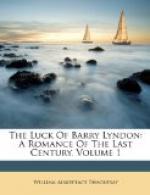in gambling and taverns, was openly unfaithful to
her; and, when she complained, threatened to remove
her children from her. Nor, indeed, is he the
only husband who has done the like, and has passed
for ‘nobody’s enemy but his own:’
a jovial good-natured fellow. The world contains
scores of such amiable people; and, indeed, it is
because justice has not been done them that we have
edited this autobiography. Had it been that of
a mere hero of romance—one of those heroic
youths who figure in the novels of Scott and James—
there would have been no call to introduce the reader
to a personage already so often and so charmingly
depicted. Mr. Barry Lyndon is not, we repeat,
a hero of the common pattern; but let the reader look
round, and ask himself, Do not as many rogues succeed
in life as honest men? more fools than men of talent?
And is it not just that the lives of this class should
be described by the student of human nature as well
as the actions of those fairy-tale princes, those
perfect impossible heroes, whom our writers love to
describe? There is something naive and simple
in that time-honoured style of novel-writing by which
Prince Prettyman, at the end of his adventures, is
put in possession of every worldly prosperity, as he
has been endowed with every mental and bodily excellence
previously. The novelist thinks that he can do
no more for his darling hero than make him a lord.
Is it not a poor standard that, of the summum bonum?
The greatest good in life is not to be a lord; perhaps
not even to be happy. Poverty, illness, a humpback,
may be rewards and conditions of good, as well as
that bodily prosperity which all of us unconsciously
set up for worship. But this is a subject for
an essay, not a note; and it is best to allow Mr.
Lyndon to resume the candid and ingenious narrative
of his virtues and defects.]
Her infernal temper (Mrs. Stammer was the jade’s
name) and my wife’s moody despondency, made
my house and home not over-pleasant: hence I
was driven a good deal abroad, where, as play was the
fashion at every club, tavern, and assembly, I, of
course, was obliged to resume my old habit, and to
commence as an amateur those games at which I was
once unrivalled in Europe. But whether a man’s
temper changes with prosperity, or his skill leaves
him when, deprived of a confederate, and pursuing
the game no longer professionally, he joins in it,
like the rest of the world, for pastime, I know not;
but certain it is, that in the seasons of 1774-75 I
lost much money at ‘White’s’ and
the ‘Cocoa-Tree,’ and was compelled to
meet my losses by borrowing largely upon my wife’s
annuities, insuring her Ladyship’s life, and
so forth. The terms at which I raised these necessary
sums and the outlays requisite for my improvements
were, of course, very onerous, and clipped the property
considerably; and it was some of these papers which
my Lady Lyndon (who was of a narrow, timid, and stingy
turn) occasionally refused to sign: until I persuaded
her, as I have before shown.




